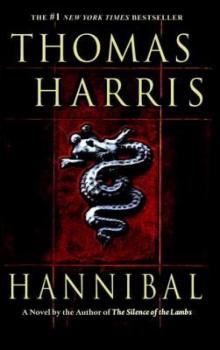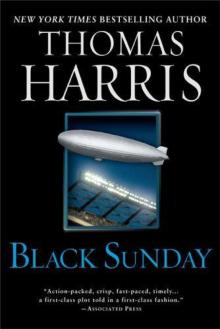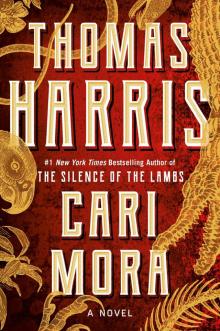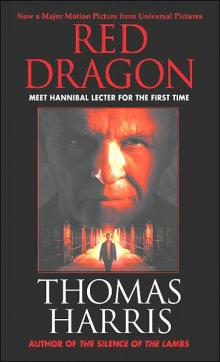- Home
- Thomas Harris
Cari Mora Page 3
Cari Mora Read online
Page 3
Antonio fished often with the young policemen and he knew things.
He tossed back the last of his drink. “I can service the pool after eight tomorrow. It leaks and I can drag out fixing it.”
“What about the foreman, the agent for the house, is it still Felix?” Captain Marco said.
Benito nodded. “Felix is a shit crayon. His work hat cost five hundred fifty dollars plus tax, what does that tell you? The good thing is he doesn’t notice much. The young lady in the house is very nice, though. Wonderfully nice.”
“You can say that again,” Antonio said.
“She should not stay there with Hans-Peter Schneider.”
“I spoke with her on the phone, she’s not staying at night,” Antonio said.
“Too bad Schneider has seen her at all,” Benito said.
“Go in tomorrow,” Captain Marco said. “I’ll bring the boat up the bay about nine o’clock with my crew and work the crab traps. We’ll foul a line and hang out there for a while. If there’s a problem, Benito, take off your hat and fan yourself with it. We’ll come in for you. If you have your hands up, knock your hat off your head by accident. We’ll come in hot if we have to—when you hear the motor get low. Don’t be Marines, Don Ernesto just wants to know what’s going on at the house.”
Thunderheads stood over the Everglades to the west. Lightning pulsed inside them. To the east the skyline of Miami glittered like an iceberg.
Beside the crab boat at the dock a manatee surfaced to breathe and wheeze. The manatee listened for the soft breath of the calf beside her. Satisfied, she sank out of sight.
Chapter Six
Benito came early with the contract gardeners to the big house on Biscayne Bay. He was chopping weeds against the seawall at midmorning when he heard the tour boat coming. The old man shot a look at the second-floor terrace. The thug Umberto in his black muscle shirt had heard the boat coming too. He was dragging a dusty movie camera out onto the terrace.
Benito could see the suppressor on Umberto’s AR-15 sticking two inches above the railing. The old gardener shook his head. The carelessness of young people. No, that’s an old-man thought. It is not Umberto’s youth that is to blame, it is his stupidity, which he will not outgrow.
“Take the reflector with you,” Felix shouted to Umberto from his seat indoors in the air-conditioning. Felix in his $550-plus-tax Panama hat, actually made in Ecuador.
Biscayne Bay lay gray-green under the overcast sky, and beyond the bay stood the towers of downtown Miami, four miles across the water from this house on Miami Beach.
The tour boat was still three houses down, close inshore, coming down Millionaire’s Row on the high tide. It was a big pontoon boat with a surrey top, a pop tune playing on its speakers. The guide had been a carnival barker in his time. His amplified voice bounced off the big houses on the waterfront, many of them shuttered for the summer.
“On our left, the home of music mogul Greenie Pardee. Look carefully and you can see the sun reflect off an entire wall of gold records that adorns his den.”
The tour boat was almost even with Benito now. He could see the pale faces of the tourists along the railing.
The guide keyed music from the movie Scarface and talked over it:
“On a darker note, to our left, where you see the tattered green awnings, the faded wind sock, the overgrown helicopter pad—that is the house once owned by Pablo Escobar, dope kingpin, murderer, bloody billionaire, slain by police on a rooftop in Colombia.
“Nobody lives there now. The house is rented out for filming until a new owner comes along. Say! We’re in luck! Looks like they’re shooting a movie today! Can anybody spot a star?”
The guide waved to Benito. Benito raised his hand, a solemn wave. The tourists saw that the old man was not a star. Few of them waved back.
Farther out on the flat green water Captain Marco’s crab boat worked a trapline, its diesel drowning out the guide from time to time.
Up on the terrace Umberto unscrewed a wing nut on the camera, then screwed it back tight.
“Take the lens cap off,” Felix said from his cool seat indoors. “Be convincing.” Felix with the two-hundred-dollar shades.
“You can buy the Escobar house if you want it,” the guide said as the boat slid past. “All you need is twenty-seven million dollars. Now, four houses down we’re coming to the palatial home of leading pornographer Leslie Mullens. Does Around the World in Eighty Ways ring a bell? And ironically his next-door neighbor is Alton Fleet, televangelist and faith healer, whose ministry numbers millions of followers across the land, spellbound by his faith healing services broadcast from Cathedral of the Palms.” The boat moved on, the tinny voice trailing away.
A jackhammer in the basement shivered the Escobar house. Dust rose from the terrace. Lizards ran for the cracks.
Old Benito hoped Cari Mora would come outside. It would be very pleasant to see her and to look at her and hear her voice.
Bubbles in the swimming pool indicated that Antonio, in his scuba gear, was still submerged looking for the leak. His presence encouraged Benito to think that Cari might come out. And in a few minutes, sure enough, here she came wearing baggy hospital scrubs.
Caridad Mora carried two frosted glasses of mint tea, and—oh YES!—she was bringing one to Benito. He could smell her excellent aroma and he could smell the mint in the tea. He lifted his hat. He could smell his hat too, so he put it back on quickly.
“Hola, Señor Benito,” she said.
“Mil gracias, Señorita Cari. You are a pleasant sight today and always.” It is easy to see why Cari’s cousin won the beauty title of Miss Hawaiian Tropic at no less a venue than the Nikki Beach club, Benito thought. Cari could have entered too and won easily if it were not for the scars on her arms. Truly they are only snaky lines on her clear brown-gold skin. The scars are more exotic than disfiguring. Like cave paintings of wavy snakes. Experience decorates us.
Cari smiled at him; Benito felt that she saw him for the man he was. She left him a little breathless, like a shot of overproof rum, like a puff of Two-Toke Sour Diesel. Like his Lupe did forty years ago.
Benito looked into her face. “Cari?”
“Yes, mi señor?”
“You must be very careful with these people.”
She looked straight back at him. “I know. Thank you, Señor Benito.”
Cari stopped by the swimming pool and considered the trail of bubbles. She slipped off her shoe and put her foot on the head of the submerged Antonio. He came up sputtering more than he strictly needed to. Antonio in his wet pool service T-shirt, a black Gothic cross earring in his left ear.
Cari put his glass of tea on the tiles beside the pool.
Antonio pushed up his mask and grinned at her.
“Gracias, Guapa!! Hey, I need to talk to you! Guess what? I got tickets to Juanes at the Hard Rock! Great seats! Any closer and he’d fall off the stage looking at you. Dinner and the show, how about it?”
She was shaking her head before he even finished.
“No, Antonio. Plenty of girls would love to go with you. I can’t.”
“Why not?”
“Because you have a wife is why.”
“Baby, it’s not like that. It’s just a green card thing. We don’t even—”
“A wife is a wife, Antonio. Thank you, but no.” She walked back toward the house under Antonio’s avid gaze.
“Gracias for the tea, Guapa,” he said.
“Exhibit manners, Antonio,” Benito called from a distance. He was smiling. “Princesa Guapa to you!”
“Discúlpeme! Gracias, Princesa Guapa!” Antonio called after her.
She laughed but did not look back at him.
Benito took a deep drink, set his tea on the seawall. That was very refreshing. The tea is good too.
Behind him in the center of the swimming pool stood a plaster copy of the Winged Victory of Samothrace, headless, her wings spread. A previous owner had believed he was buying it from th
e Louvre.
Benito looked at the Victory, thinking. I wonder if she lost her dream of flight along with her head, or if I can still see it there in the heat shimmer above the stump of her neck, or maybe it is still in her heart, where we keep dreams. Perhaps that is an old-man thought I should avoid. I wonder if Cari can still keep dreams in her heart after the things she has seen. I have seen things too. I hope the ceiling of her heart is higher than the ceiling of mine.
At midafternoon an Uber brought Cari Mora into the driveway with a lot of groceries. The driver helped her unload a trunkful of bags and set them on the lawn. Quickly Benito put down his hoe and picked up the four bags that looked heaviest.
“Thank you, Señor Benito,” she said. Together they went through the side door of the house, into a sunroom with a big cockatoo in a cage. To get attention, the bird had hung upside down from its perch and lifted the edge of the newspaper cage liner with its beak to spill seed and seed hulls onto the floor.
Benito and Cari carried the groceries into the kitchen. It was noisy in the kitchen, noise coming up from below, where power tools were working. A red extension cord snaked from the laundry room through a door to the basement and down the stairs. Another cord was plugged in behind the stove. Benito wanted to see into the basement. Some acetylene tanks were standing against the wall of the kitchen, waiting to be carried down. He put down the four bags of groceries on the counter and had started for the open door to look into the basement when Umberto came up the stairs into the kitchen.
“What the fuck are you doing in here?” he said.
“I am bringing in groceries,” Benito said.
“Get the fuck out. Nobody is allowed in the house.” To Cari: “We told you that. Nobody in the house.”
“I am bringing in groceries,” Benito said. “And not flushing a dirty mouth in front of a lady. You could bring the groceries in, if you can lift them.”
It was not a smart thing to say. Sometimes old men don’t care how foolish something is if it feels good right away. Benito had his hand inside the bib of his overalls.
Umberto could not be sure what Benito might have in there behind the bib. In fact, Benito had, just beneath his sternum, a 1911A1 Colt .45 pistol converted to a .460 Rowland, gift of his doting nephew, who blew up watermelons with it on the range. Benito carried it cocked and locked.
Umberto thought the old man looked a little crazy in the face.
“No one is allowed in the house,” Umberto said. “She could get fired for letting you in. Want me to tell the boss?”
Cari turned to Benito. “Thank you, mi señor,” she said. “It’s all right. Please, I can manage the rest.”
“Excuse you,” Benito said into Umberto’s face and left the kitchen.
A big school of crevalle jacks surged by in the late afternoon with a roar like a train, chasing mullet along the seawall where Benito cut weeds with his hoe. Benito could smell them and he leaned over the waist-high seawall to watch as the powerful fish raced by, their forked tails flashing and small fish and pieces of fish flying in the air, an oily urine smell rising from the water behind them. Like us, Benito thought. Kill and gobble like us.
Through the soles of his shoes he could feel the jackhammer working in the basement of the house.
Then the trembling ground against the seawall gave way beneath his hoe, dirt falling to splash far below. He was looking down into a new hole in the lawn against the seawall. The hole was the size of his hat. Many feet underneath the lawn he could see the light glint off black water, swelling and falling away down there in the dark underground, inside the seawall. He stepped back onto the concrete edge of the patio. He could hear the water gurgling under there, sucking in and out under the seawall. The hole breathed with the swells, exhaling the stench of rotting meat.
Benito looked up at the high terrace. Felix was up there haranguing Umberto with his back to the garden. Benito snaked a cell phone out of his overalls and turned on the flash. He went to his knees beside the hole. Dexterous for such an old man, he put his hand down in the hole and took two flash pictures of the space he could not see, turning his face from the smell.
Felix was still talking up on the balcony.
Benito hissed at Antonio, standing in the pool. Antonio put down his tea fast and came out of the water. He went with Benito behind the pool house where spare flagstones and roof tiles were stacked.
“Let’s take a flagstone, we’ll put it over the hole and you go back to work,” Benito said.
“You calling Marco?” Antonio said. He looked out over the bay to the crab boat. The crew had opened a barrel of bait and the gulls and a pelican were following the boat.
Benito and Antonio carried a flagstone and covered the hole.
“Stay on the patio, don’t step off on the grass, it could cave some more,” Benito said. “You should get back in the pool now.”
The old gardener got a potted plant and put it on top of the flagstone. He was raking dirt around it when he heard Felix behind him.
“The hell are you doing?” Felix said.
“Covering up a sinkhole. We’ll bring some dirt and—”
“Let me see. Open it up.”
The hole was webbed with roots.
“Shit,” Felix said. He took out his cell phone. “Get me a cushion out of the pool house. Hurry up.”
Kneeling on the cushion to preserve his linen trousers, Felix held his telephone down in the hole and took a picture using his flash.
“Cover it up and put the plant on it,” he said.
“Like it was before?” Benito said.
Felix put his phone back in his pants and took from his pocket another expensive accessory, an ornate out-the-front spring dagger for which he had paid $400. He popped the blade out and cleaned a fingernail. He held up the knife and, looking at Benito, slid the blade back into the handle. With the other hand he extended a folded hundred-dollar bill. “Silencio sobre esto, Viejo. Me entiendes?”
Benito looked him in the face. He waited a beat before he took the money and crushed it in his hand. “Claro, señor.”
“Go in the front-yard garden, help them up there.”
Antonio was taking some tracer dye out of his pack beside the pool when Felix told him, “Pack up your shit, you’re finished for the day.”
“I haven’t found the leak yet.”
“Pack your stuff and get out. I’ll call when I want you to come back.”
Antonio waited until Felix turned away before he took off his swim fins. On the bottom of his foot was the tattoo, a bell suspended from a fishhook, along with his blood type. Quickly he slipped on his shoes.
Inside the house, Cari let the big white cockatoo out of its cage. It was standing on her wrist eyeing her earrings when the doorbell rang. She went past draped furniture and a jukebox to the side entrance, still carrying the bird. Antonio was waiting at the door. He looked around quickly.
“Listen, Cari. You need to be away from here. Stay inside right now. Don’t see nothing. Be dumb until they send you away—are you listening to me? If they don’t fire you by the end of the day, take the bird home with you. Say the dust is hurting it. Get the flu at home and don’t come back.”
“Touch it, Mamacita!” the bird said.
Felix came around the side of the house in a hurry. “I told you to get your ass out of here, now move it.”
Antonio fronted him up. “You kiss your mother with that mouth?”
“Get out,” Felix said as he stalked away, fumbling with his cell phone.
Antonio’s pool service truck was parked by the gardening crew’s van. Three of the gardeners were stacking fallen palm fronds, a fourth was running a weed eater in the long driveway. When Antonio threw the last of his equipment in the back of the truck he saw Cari standing in the front door of the house. She was still holding the bird. She smiled at him and waved goodbye.
Behind the house Felix punched a number into his phone.
Chapter Seven
Hans
-Peter Schneider and Bobby Joe of the yellow eyes arrived in Bobby Joe’s truck to find the driveway of the Escobar house blocked by the gardener’s van. Bobby Joe drove Hans-Peter across the lawn and the flower beds to the front door.
Bobby Joe’s truck had a lift kit, a simulated roll bar of chromed plastic and a pair of TruckNutz rubber testicles hanging from the trailer hitch. His bumper sticker said IF I’D KNOWN THIS I WOULD OF PICKED MY OWN COTTON.
Felix was there to greet them. He whipped off his hat.
“Patrón,” Felix said.
“Who found it?” Schneider was already walking toward the waterside garden. He wore linen in the heat, and black patent huaraches to match his watchband.
“The old man who cuts the weeds.” Felix indicated Benito, loading tools into the van with the other gardeners. “He doesn’t know anything, I took care of him.”
Hans-Peter watched Benito for a minute. “Show me the hole,” he said.
At the hole against the seawall, Felix and Bobby Joe dragged the flagstone aside. Hans-Peter stepped back, waving the air in front of his face.
Felix showed Hans-Peter the picture he’d taken holding his camera down in the hole. He had moved the picture to an iPad.
The sea had come under the seawall to eat out a cave beneath the concrete patio extending almost to the house. The roots of trees hung down into the cave like crooked chandeliers. Pilings knobbed with barnacles supported the patio above. The water level at this stage of the tide left about four feet of space between the water and the ceiling. The erosion had exposed under the patio half of a sunken iron gravel barge, part of the landfill and dredging that built Miami Beach.
At the far end of the black cave, barely lit by the flash, the bottom shelved up into a beach. A shiny cube larger than a refrigerator stood at the far end of the cave, almost flush against the foundation of the house. Felix spread his fingers on the iPad, enlarging the picture. Beside the cube, at water’s edge, were a human skull and the back half of a dog.

 The Silence of the Lambs
The Silence of the Lambs Red Dragon
Red Dragon Hannibal
Hannibal Black Sunday
Black Sunday Cari Mora
Cari Mora Hannibal Rising
Hannibal Rising Red Dragon hl-1
Red Dragon hl-1 The Silence of the Lambs (Hannibal Lecter)
The Silence of the Lambs (Hannibal Lecter)